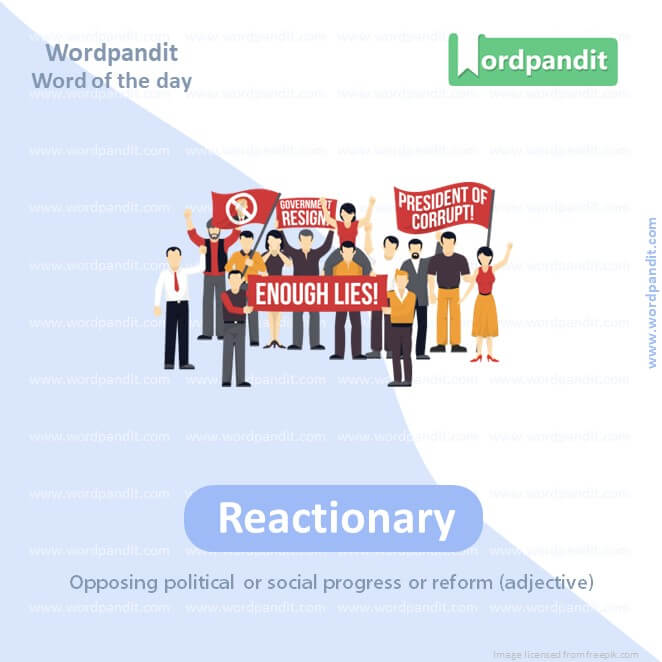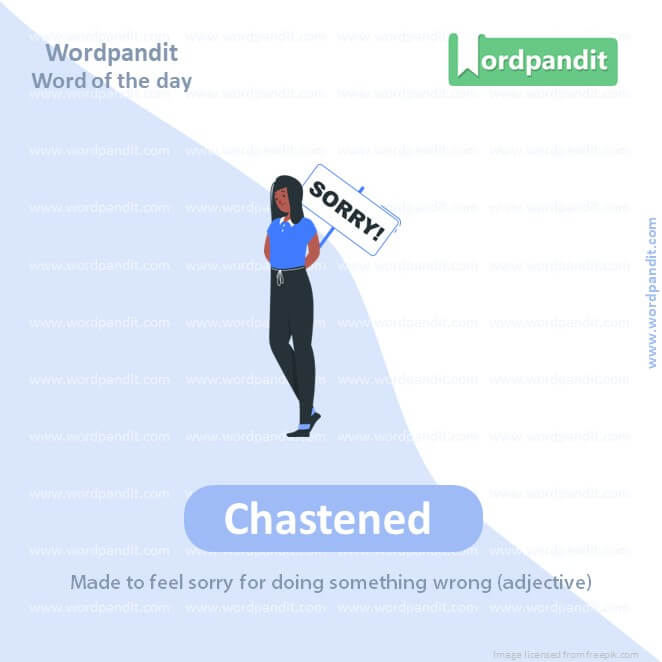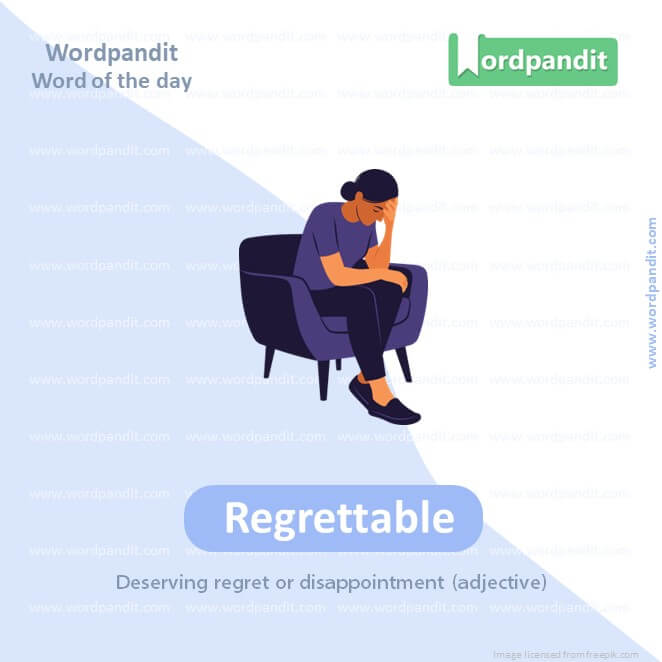Daily Vocabulary Words: List of Daily Used Words in Leading International Newspapers
Hi there. Welcome to this special section @ Wordpandit.
Our endeavour here is very simple: to highlight important daily vocabulary words, which you would come across in leading newspapers in the country. We have included the following newspapers in our selection:
• The New York Times
• The Washington Post
• Scientific American
• BBC
• The Guardian
• Psychology Today
• Wall Street Journal
• The Economist
We are putting in extensive work for developing your vocabulary. All you have got to do is be regular with this section and check out this post on a daily basis. This is your repository of words that are commonly used and essentially, we are posting a list of daily used words. Hence, this has significant practical application as it teaches you words that are used commonly in leading publications mentioned above.
Visit the website daily to learn words from leading international newspapers.

WORD-1: Reactionary
CONTEXT: Countless mobilized reactionary groups have more media attention than they have organic audience.
SOURCE: New York times
EXPLANATORY PARAGRAPH: Imagine you’re playing a game and you want to go backwards instead of forwards because you liked how things were before. That’s a bit like being “reactionary.” It means wanting things to stay the same or go back to how they used to be, even if other people want them to change.
MEANING: Opposing political or social progress or reform (adjective).
PRONUNCIATION: ree-AK-shuh-ner-ee
SYNONYMS: conservative, traditionalist, backward-looking, retrogressive, ultraconservative
USAGE EXAMPLES:
1. Grandpa is a bit of a reactionary; he prefers the old ways of doing things.
2. The political party’s reactionary stance didn’t resonate with younger voters.
3. Some people are reactionary about technology, preferring older methods over new ones.
4. Her reactionary views on social issues often clash with more progressive opinions.

WORD-2: Maneuvering
CONTEXT: The far bigger challenge for the justices is ensuring that Trump does not manage, yet again, to game the system by maneuvering to delay trial into summer or beyond.
SOURCE: Washington post
EXPLANATORY PARAGRAPH: You know when you’re playing with toy cars and you move them around to avoid crashing into each other or to go around obstacles? That’s called “maneuvering.” It’s about carefully changing direction or position to get where you want to go without any trouble.
MEANING: Skillful or strategic moving or planning (noun).
PRONUNCIATION: muh-NOO-ver-ing
SYNONYMS: navigating, steering, directing, guiding, piloting
USAGE EXAMPLES:
1. The ship’s captain was maneuvering through the narrow channels of the harbor.
2. She maneuvered her way through the crowded room to find her friend.
3. The politician was skilled at maneuvering through difficult negotiations.
4. With careful maneuvering, he avoided the obstacles on the obstacle course.

WORD-3: Nefarious
CONTEXT: The speed, scale and amplification of the power to capture an aspect of routine workaday life and cast it as nefarious activity are staggering.
SOURCE: New york times
EXPLANATORY PARAGRAPH: Imagine a character in a story who sneaks around in the shadows doing very bad things, like stealing treasure or causing trouble for others just because they enjoy it. That character would be described as “nefarious.” It means being really, really bad and doing things that are very wrong.
MEANING: Wicked, villainous, or criminal (adjective).
PRONUNCIATION: nuh-FAIR-ee-us
SYNONYMS: wicked, evil, villainous, heinous, depraved
USAGE EXAMPLES:
1. The villain’s nefarious plan was to take over the city and rule with fear.
2. She uncovered a nefarious plot to defraud unsuspecting investors.
3. The police were determined to stop the nefarious activities of the crime syndicate.
4. The king’s advisor was secretly involved in nefarious schemes to undermine the kingdom.

WORD-4: Chastened
CONTEXT: An appeals court slapped her down, but Cannon doesn’t seem chastened.
SOURCE: Washington post
EXPLANATORY PARAGRAPH: Have you ever done something wrong and then felt really sorry about it? When you realize you’ve made a mistake and you feel bad, that’s like being “chastened.” It’s a feeling of being sorry and wanting to do better next time.
MEANING: Made to feel sorry for doing something wrong (adjective).
PRONUNCIATION: CHAY-suhnd
SYNONYMS: penitent, repentant, remorseful, contrite, humbled
USAGE EXAMPLES:
1. After being scolded, the child looked chastened and promised not to misbehave again.
2. The team’s defeat in the championship game left them chastened but determined to improve.
3. She was chastened by the criticism of her work and resolved to do better next time.
4. His chastened demeanor showed that he had learned from his mistakes.
WORD-5: Dichotomous
CONTEXT: All of this dichotomous thinking forgets one thing: Academics are not born; they’re made. More broadly, administrators of Harvard, or anywhere else for that matter, are not born; they are made.
SOURCE: New york times
EXPLANATORY PARAGRAPH: Imagine if you had a big box of toys, and you decided to sort them into two groups: toys you like and toys you don’t like. That’s making a “dichotomous” division, which means separating things into two completely different groups.
MEANING: Divided or dividing into two sharply contrasting parts or opinions (adjective).
PRONUNCIATION: die-KAH-tuh-muhs
SYNONYMS: divided, split, bifurcated, dualistic, twofold
USAGE EXAMPLES:
1. The author presents a dichotomous view of the world, with characters either good or evil.
2. The political debate became dichotomous, with clear divisions between the two parties.
3. His dichotomous thinking didn’t allow for any middle ground or compromise.
4. The psychologist explored the dichotomous nature of human behavior in his research.

WORD-6: Regrettable
CONTEXT: On that score, the justices’ decision not to take up the immunity matter immediately, as special counsel Smith asked, was regrettable but not necessarily disastrous.
SOURCE: Washington post
EXPLANATORY PARAGRAPH: Have you ever done something you wish you hadn’t? Maybe you broke your favorite toy accidentally or said something mean to a friend. Those kinds of things are called “regrettable.” It means you feel really sorry about what happened and wish you could take it back.
MEANING: Deserving regret or disappointment (adjective).
PRONUNCIATION: rih-GRET-uh-buhl
SYNONYMS: unfortunate, lamentable, deplorable, unfortunate, disappointing
USAGE EXAMPLES:
1. It’s regrettable that we missed the opportunity to see the rare bird.
2. His regrettable actions at the party led to his friends being upset with him.
3. The accident was regrettable, but thankfully no one was seriously hurt.
4. She made a regrettable decision that she would later come to deeply regret.
WORD-7: Supposedly
CONTEXT: the moral case for “diversity” must contend with the supposedly rational case for “merit” or achievement.
SOURCE: New york times
EXPLANATORY PARAGRAPH: Have you ever heard a story from someone, but you’re not sure if it’s true? When people say something is “supposedly” true, it means that they’ve heard it from someone else, but they’re not completely sure if it’s accurate or correct.
MEANING: According to what is generally said, claimed, or believed, though not necessarily proven to be true (adverb).
PRONUNCIATION: suh-POHZ-ed-lee
SYNONYMS: purportedly, allegedly, apparently, ostensively, reportedly
USAGE EXAMPLES:
1. Supposedly, there’s buried treasure hidden somewhere in the old mansion.
2. He was supposedly the best student in the class, but nobody had seen his grades.
3. The car was supposedly parked outside, but nobody could find it.
4. Supposedly, the movie is based on a true story, but some facts have been exaggerated.
WORD-8: Insurrection
CONTEXT: The second monumental Trump case involves Section 3 of the 14th Amendment and the issue of whether Trump can be removed from the ballot for having engaged in insurrection.
SOURCE: Washington post
EXPLANATORY PARAGRAPH: Imagine if a group of toys decided they didn’t want to listen to the rules anymore and started a big mess in your room. That’s similar to what an “insurrection” is. It’s when a group of people rebel against the rules or the government, causing chaos and trouble.
MEANING: A violent uprising against an authority or government; rebellion or revolt (noun).
PRONUNCIATION: in-suh-REK-shuhn
SYNONYMS: rebellion, uprising, revolt, mutiny, riot
USAGE EXAMPLES:
1. The insurrection led to widespread chaos and destruction in the city.
2. The history books are filled with tales of insurrection against oppressive regimes.
3. The government quickly quelled the insurrection before it could gain momentum.
4. The insurrection was fueled by dissatisfaction with the current leadership.
WORD-9: Dismayed
CONTEXT: In the 1920s, Harvard (along with Yale and Princeton) was dismayed that so many Jewish students were passing its carefully designed admissions tests.
SOURCE: New york times
EXPLANATORY PARAGRAPH: Have you ever been really excited about something, but then found out it wasn’t going to happen after all? That feeling of disappointment and sadness is like being “dismayed.” It means feeling sad or worried because something didn’t turn out the way you hoped.
MEANING: To cause someone to feel sad, disappointed, or worried (verb). Also, feeling sad, disappointed, or worried about something (adjective).
PRONUNCIATION: dih-SMAYD
SYNONYMS: disheartened, discouraged, disappointed, disconcerted, troubled
USAGE EXAMPLES:
1. The cancellation of the concert dismayed the fans who had been looking forward to it.
2. She was dismayed by the news that her favorite store was closing down.
3. He looked dismayed when he realized he had forgotten his homework at home.
4. The team was dismayed by their loss in the final moments of the game.
WORD-10: Unimaginable
CONTEXT: But it is unimaginable that the court would give state courts or other state officials the authority to do so.
SOURCE: Washington post
EXPLANATORY PARAGRAPH: Think about the craziest, most unbelievable thing you can think of. Now, imagine something even more unbelievable than that. That’s what “unimaginable” means—something so incredible or extraordinary that it’s hard to even imagine or believe.
MEANING: Impossible to imagine or conceive; beyond the limits of one’s imagination (adjective).
PRONUNCIATION: uhn-uh-MAG-in-uh-buhl
SYNONYMS: inconceivable, unthinkable, incredible, beyond belief, unimaginable
USAGE EXAMPLES:
1. The destruction caused by the earthquake was unimaginable.
2. The amount of wealth he possessed was unimaginable to most people.
3. The complexity of the human brain is almost unimaginable.
4. The idea of life on other planets was once considered unimaginable.
Vocabulary Definition
Understanding a language requires a deep grasp of the ‘vocabulary definition’. These precise meanings of words shape our understanding and communication. However, to successfully learn ‘vocabulary definition’, one must do more than just memorize a dictionary. So what’s the perfect approach to assimilating ‘vocabulary definition’?
The compelling answer is context. To truly comprehend ‘vocabulary definition’, expose yourself to diverse reading materials such as books, magazines, newspapers, and digital content. This approach equips you with a practical understanding of ‘vocabulary definition’ and illuminates the nuanced ways in which they get employed in conversation and writing.
An innovative way to enhance memory while learning ‘vocabulary definition’ involves visualization. By creating a mental image representing the definition, your brain can help cement the association between the word and its meaning, improving recall capability significantly.
Now, understanding and retaining ‘vocabulary definition’ is only one part of the equation. The other, equally essential part is application. Actively using these words in your personal conversations, professional communication, or social media posts will reinforce your understanding and usage of ‘vocabulary definition’.
Interactive language tools can be a great help when mastering ‘vocabulary definition’. Language-learning software and applications often provide comprehensive word definitions, examples, and even quizzes to test your learning progress.
In conclusion, the journey of embracing ‘vocabulary definition’ demands a blended approach. Diversified reading materials, visualization techniques, active application, and the leverage of modern language-learning tools together chart a pathway to mastering ‘vocabulary definition’. Remember, every word definition you conquer is a stepping stone leading you to the magnificent mansion of language proficiency. Happy learning!










